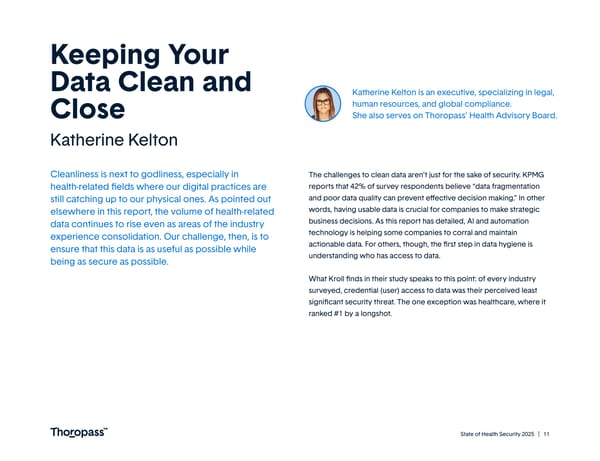Keeping Your Data Clean and Katherine Kelton is an executive, specializing in legal, If fragmented data can inhibit decision making, it can also hinder human resources, and global compliance. collaboration. But clearly collaboration is not without its risks, Close She also serves on Thoropass’ Health Advisory Board. according to Kroll. Because the healthcare industry can be both siloed and spread out by its very nature (not even considering the vast Katherine Kelton network of third party vendors on which most organizations rely), it’s both understandable and unfortunate that this one particular threat is still fre ed over, especially since email compromises continue to be Cleanliness is next to godliness, especially in The challenges to clean data aren’t just for the sake of security. KPMG the leading source of threat faced by healthcare organizations. health-related fields where our digital practices are reports that 42% of survey respondents believe “data fragmentation As a result, it’s up to us in the industry to confront these two still catching up to our physical ones. As pointed out and poor data quality can prevent e ective decision making.” In other issues–data hygiene and data access–as one in 2025. Where AI and elsewhere in this report, the volume of health-related words, having usable data is crucial for companies to make strategic automation can help with data hygiene to a large degree, user access data continues to rise even as areas of the industry business decisions. As this report has detailed, AI and automation remains a unique cybersecurity concern that can be addressed experience consolidation. Our challenge, then, is to technology is helping some companies to corral and maintain through consolidated credentialing and monitoring. Maintaining your ensure that this data is as useful as possible while actionable data. For others, though, the first step in data hygiene is myriad regulatory and compliance frameworks through a single being as secure as possible. understanding who has access to data. dashboard where you can also control user access at the employee What Kroll finds in their study speaks to this point: of every industry level remains the gold standard for addressing data hygiene and surveyed, credential (user) access to data was their perceived least access. Likewise, regular training and ensuring that any HIPAA security significant security threat. The one exception was healthcare, where it controls (such as use of MFA) are enforced consistently across systems ranked #1 by a longshot. and end users is more important than ever. Healthcare is not unique in facing the growing importance of personal/patient data and working across dispersed teams. But given how valuable our data is, and how the frequency and severity of a acks are going up, it is more important than ever to look for technology solutions that enable secure, sustainable growth in 2025. State of Health Security 2025 | 11
 State of Health Security 2025 Page 10 Page 12
State of Health Security 2025 Page 10 Page 12